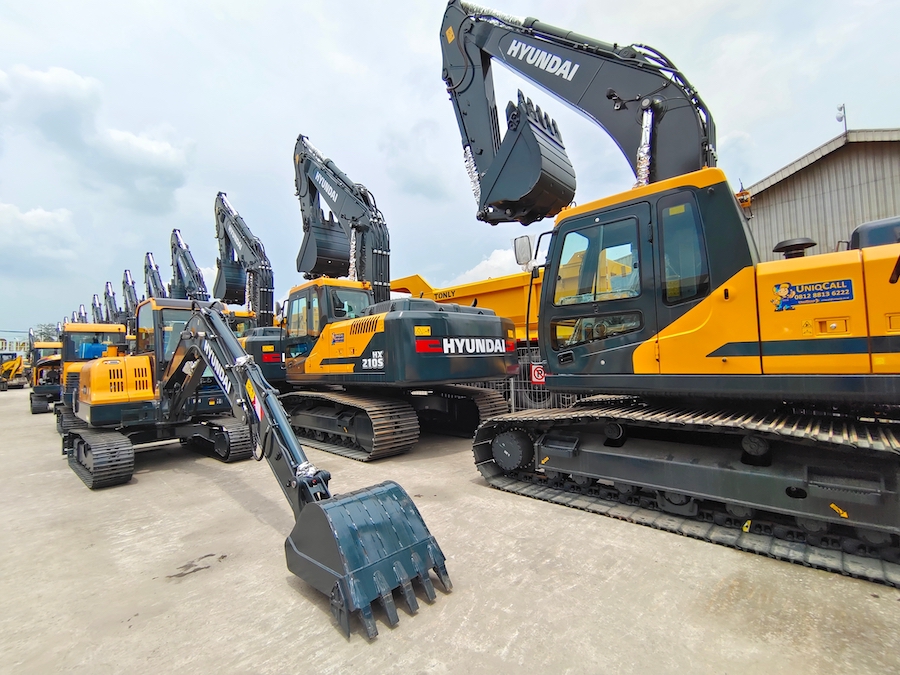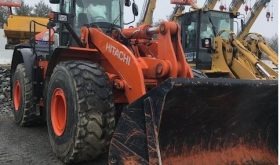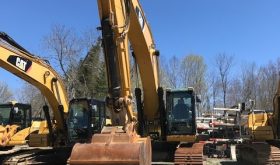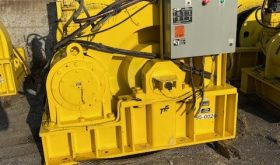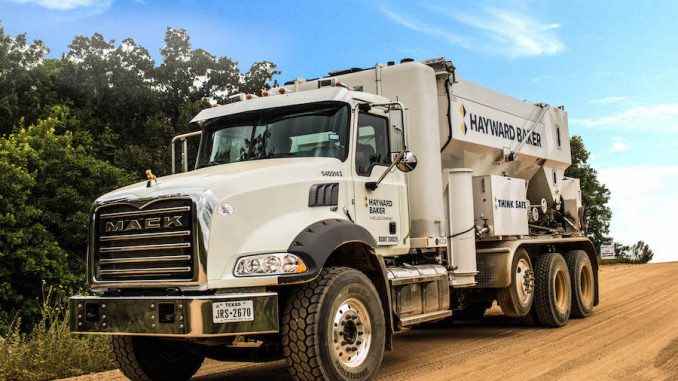
Who are Volumetric Concrete Mixers for?
Because volumetric mixers have a wealth of application abilities, it’s easy to understand how some tend to believe these units are for niche users. Yet, being able to design, produce, and pour concrete individually gives you control on the final product from start to finish.
Concrete Delivery
Concrete delivery companies rarely have downtime and if it happens, the situation affects everyone involved. But a mobile volumetric mixer eliminates the stresses of hot loads and overages and/or shortages while streamlining your ability to move quickly between deliveries. The ability to change design mixes at a moment’s notice gives you the flexibility to accommodate a last-second change or new customer.
Curbs & Gutters
Attention to detail and precise application is expected regarding curb and gutter installations and/or repairs. Then, most projects follow an unforgiving timeline and any excess time means less revenue at the end. If the slump changes halfway through the project, work stops only long enough to adjust the design mix on the unit. What formerly took more than one day is complete in several hours.
Gunite & Shotcrete
A mobile concrete mixer can seamlessly switch between wet and dry processes with precise material measurements along the way. Because this type of work frequently requires adapting the slump of the mix throughout the pour. A simple adjustment of the water flow allows for efficient and completed on schedule as you are pouring fresh concrete as needed rather than waiting for ready mix. Plus, concrete produced with a mobile mixer consistently has higher break points than traditional concrete, meaning motorists and residents can enjoy a long-lasting surface.
Road & Bridge Repair
No matter the daily traffic volume flowing over a bridge or road, when repairs are needed, you want them to be the highest quality without giving up too much time. Volumetric mixers give you control over finite concrete details, such as moisture content, that have a macro effect if improperly handled. Because all aggregates are mixed on-site, the stress of a hot load or having to schedule work in the middle of the night is eliminated.
Utility Work
With the weight of the world above, ensuring any utility work will be durable is key. The breaks in concrete fabricated with a volumetric mixer occur at a higher point on a regular basis which means the durability begins as soon as the concrete cures. Pre-installed design mixes let you account for changing conditions on the fly rather than stopping work, adjusting, then returning to work.
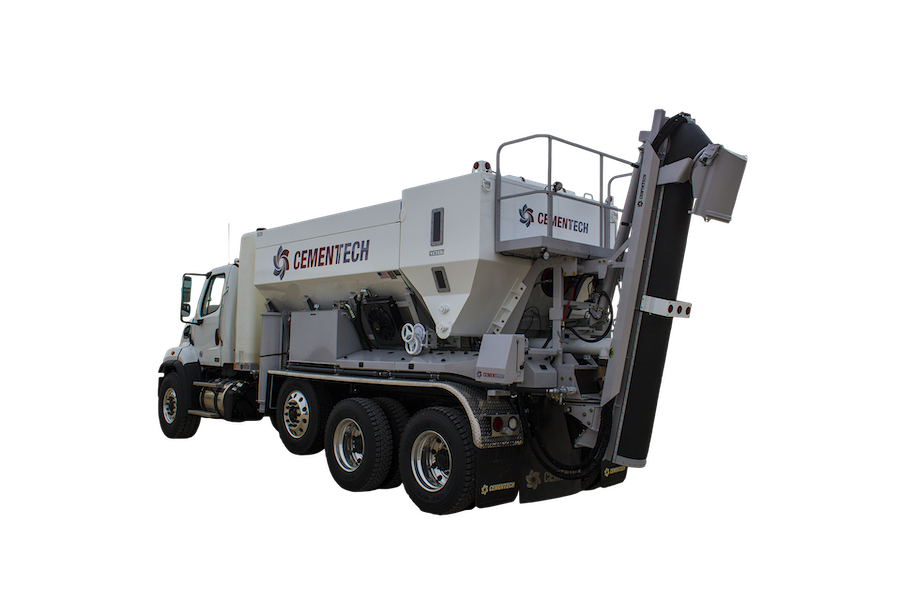
What is a Mobile Concrete Mixer?
A mobile concrete mixer, or mobile concrete dispenser as it is sometimes also called, is an on-demand concrete production solution. A mobile concrete mixer is a batch plant mounted on a chassis–usually a truck or trailer–and carries unmixed material (sand, cement, coarse aggregates, water and any other materials or chemicals needed for more specialty applications) to a job site and mixed on a continuous or intermittent basis as required for fresh maximum strength concrete.
Any amount of concrete can be produced from a yard to 400 yards or greater per day for continuous pouring as long as the unit is re-loaded with materials at the job site. Volumetric proportioning is based on volume not weight so through an easy calibration process, it is possible to produce concrete that will consistently meet or exceed the tolerances set in ASTM C685 and AASHTO M-241 standards as well as DOT requirements. You will have the exact amount needed every time.
The blending of materials is a continuous process, mixing the aggregates, sand, cement, water and admixtures for the exact mixture every time. The operator can stop the mixing and delivery, and start again at any time, allowing production to balance the demands of the finishing and placing crews.
Mix designs can be changed or altered without moving the machine; the operator can make adjustments at any time as required for the job site. When the job is finished, cleanup is an easy process by only washing out the mixer at the rear of the machine.
Mobile Mixers Have Separate Material Compartments
Mobile mixers carry materials such as sand, cement, and coarse aggregates in divided bins mounted on the unit; all the bins are loaded from the top. Water is also carried on the mixer in tanks; the size of the tank may vary based on the model. Sand and stone are carried in a side-by-side divided, open bin with the sand holding 45 percent of the bin’s volume and stone side holding 55 percent.
Aggregates can be carried separately or mixed as needed according to the design mix; the versatility of mobile mixers allows for virtually unlimited concrete mixes. Cement is carried in a watertight bin with automatic vibrators to assure accurate cement proportioning and constant cement flow to the mixer. Water is pumped into the mixer with flowmeters accurately monitoring the flow.
For other concrete output requirements or specialty jobs, liquid admixtures such as accelerators, retarders, air entraining agents and modified latex can be carried in a separate system which introduces the ingredient as needed via precise flow controls.
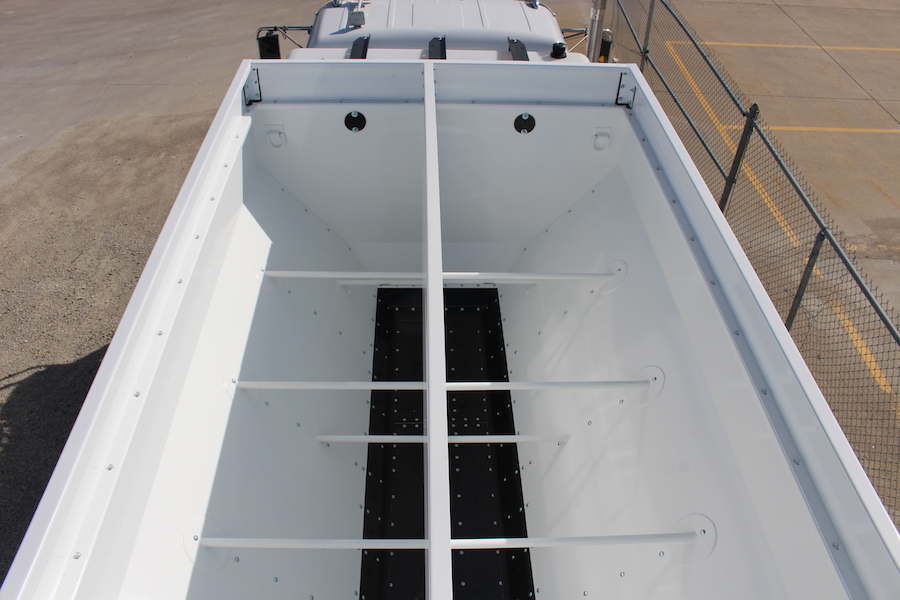
What Kind of Proportioning System do Mobile Concrete Mixers Use?
Measuring, or proportioning, by volume – not weight – is at the heart of the volumetric mobile mixer and the final product is capable of accuracies better than plus or minus one percent.
Materials are stored in separate bins and based on the mix design are proportioned into the mix. This enables the operator to mix on-site exactly what is needed, eliminating overages and shortages. Proportioning gives the operator control over the mix design and how much is mixed.
Mixing
A differentiation of mobile concrete mixers is that materials are mixed on site so the mix is fresh and has not begun the hydration process of concrete thus starting the clock before it goes bad. Materials are thoroughly mixed through the volumetric process to produce quality concrete in the exact amount needed.
Concrete produced by mobile concrete mixers meets standards established by ASTM 685 and AASHTO M-241 standards as well as DOT requirements.
What are the Benefits of Using Mobile Concrete Mixers?
Benefits for Your Business
• Increase profits by paying less for materials and have better control over your schedule and employee time.
• Expand the type of concrete applications you can offer as part of your business or do multiple jobs without having to wait for ready mix.
Benefits for Your Customer
• Eliminate complaints about shortages and overages by mixing fresh concrete on-site in the amount required.
• Handle short loads, emergencies or weekend jobs with a mixer that is flexible and can be used for any size job on short notice.
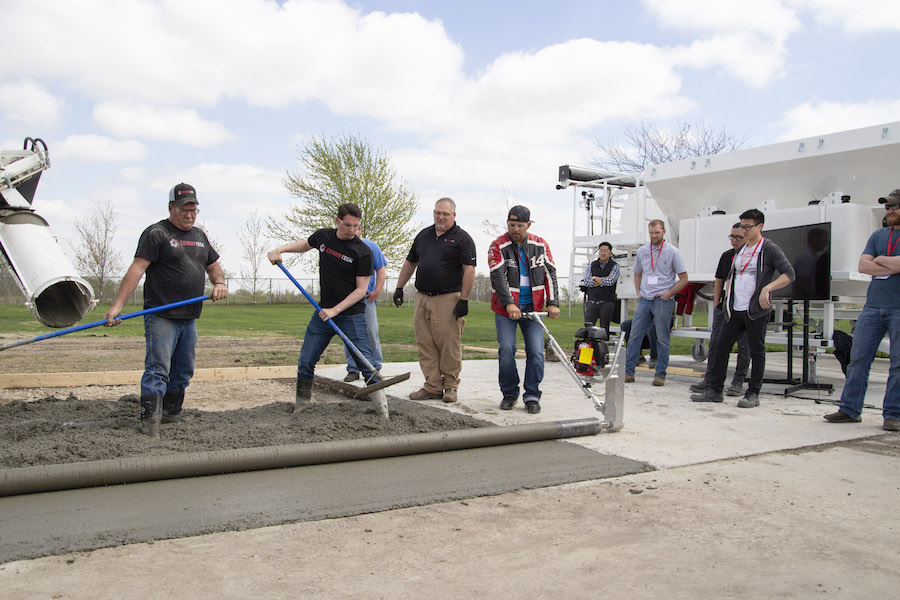
Learn to Operate a Volumetric Concrete Mixer
Operating a volumetric mixer is not hard once you learn the basics and there are several ways to get up to speed.
• You can have on-site training.
• You can watch a training video.
• You can attend a training class to learn how to operate the mixer.
All these are great tools to help an operator learn the system. Let’s break it down in more detail.
On-Site Training
A factory service technician will come to your location and train you in the proper way to do a calibration, maintenance, and operation. With hands-on training, you will start learning the basics and your service technician will also show you how to wash out the mixer which is a critical area of daily operations. The more time you run the unit, the easier it becomes and more natural it feels.
Video Training
Watching videos of calibration, maintenance and operations will demonstrate the steps to run a unit. You will need to do
a hands-on operation to get the feel of the unit and how it works. Videos can also be a great way to go back and review steps if you have questions after a service technician has left or bring another operator on board.
Training Class
Our factory offers a spring and fall class on operation, calibration, and maintenance; with these classes, you will learn the steps to run your unit. You can get some hands-on experience with a unit and these classes are good to use with on-site training for “Operator Training Certification.”
On-site training is the really best tool you can use to get up to speed the fastest because the service technician will work with you one-on-one. They will watch to make sure you understand the equipment and its capability to do the job. Running the unit is really the best teacher. Go out and do some pours. Get that experience and every day you will get better at what it takes to operate the mixer and to provide the best quality of concrete.
There are other resources you should consider when learning how to operate a volumetric mixer. All these training tools will make you a great operator and enable you to deliver the best concrete!
• In what applications will you use the mixer?
• Will a truck or trailer-mounted unit work best?
• What volume of concrete with be poured monthly, annually?
• What mix design(s) will you need to produce?
• How quickly do you need to produce your concrete?
• For truck-mounted mixer, what brand of chassis do you prefer?
These factors affect the price of your mixer. Before a manufacturer quotes you a price, they need to understand your specific needs. Many times customers believe Cemen Tech equipment is priced higher than the competition until they discover the mixer they have been quoted at a lesser price will not meet their needs.
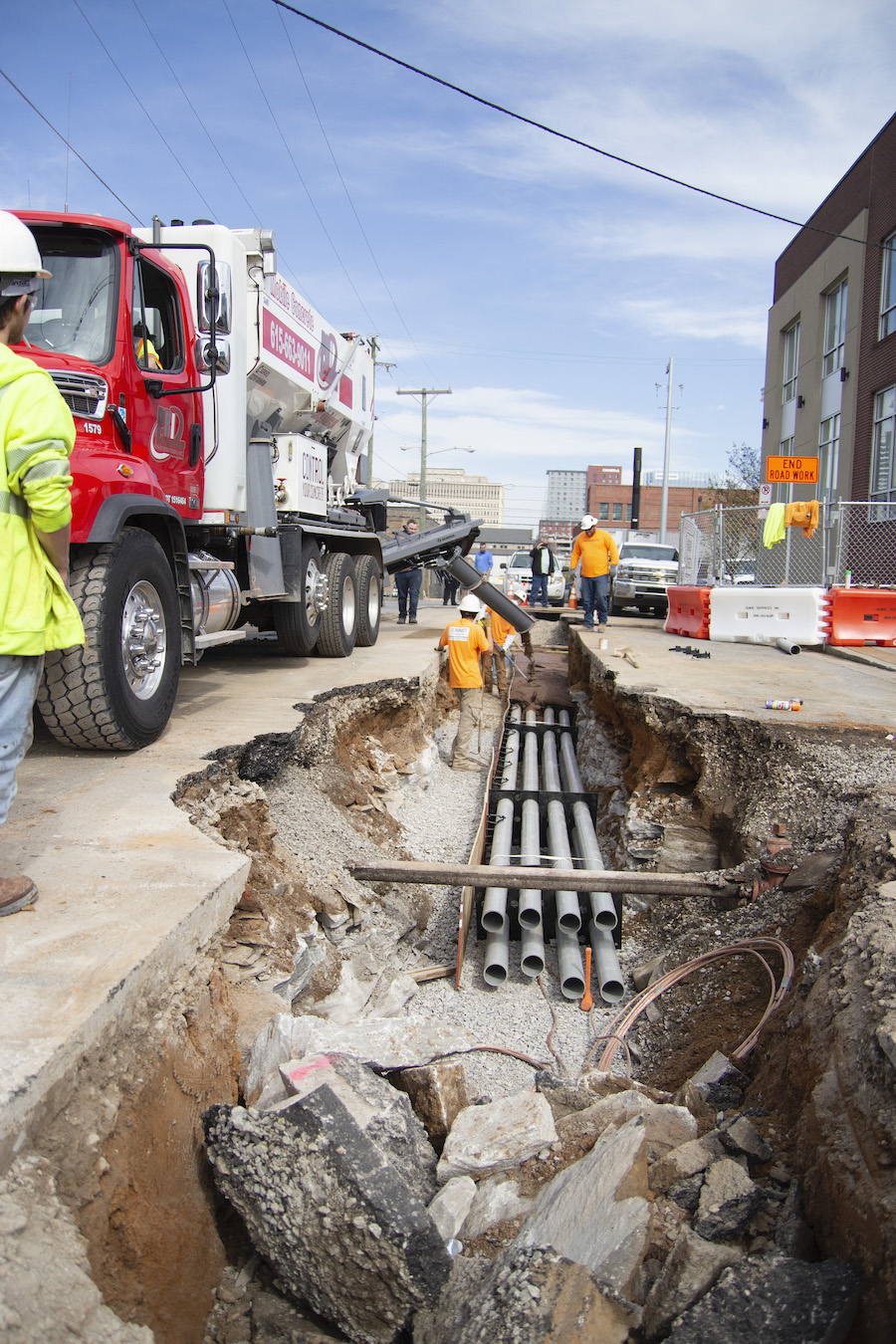 Initial Purchase Price Comparison
Initial Purchase Price Comparison
To get the right equipment in your hands, the equipment manufacturer or dealer needs to understand how you will use
the mixer. Mobile mixers come in various sizes, generally 2 cubic yard to 12 cubic yard capacities, and speeds, generally 15 cubic yards to 90 cubic yards an hour.
The capacity, speed and how the mixer is equipped determines the cost of the mixer. A smaller, slower mixer will cost less than a large, quick mixer. Technology has come a long way in mobile mixers, and most manufacturers offer cordless remotes, electronic ticket printers, fiber feeders or choppers,
and roll and pour options to help place concrete and provide your customers a record of their purchase, including the mix design. Some mixers are even equipped with technology such as touchscreen PLCs, which:
• Store an unlimited number of mix designs;
• Alert when maintenance tasks are required;
• Report the amount of concrete poured and the time of the pour; and
• Offer auto washout functions and an auto stow feature.
While these mixers are new to the market, the level of automation they feature is quickly growing in popularity. So what does a mobile mixer cost? A broad range is $65,000 to $135,000, depending on options, but you also need to consider your return on investment and factors such as parts availability, how long the company has been in business and their industry reputation.
Measure Your Return On Investment
Before you purchase any equipment, you need to consider how long it will take to see a return on your investment. Do you spend less upfront and risk facing issues such as breakdowns, tracking down hard-to-find or expensive parts, or purchasing a non- operator machine? Or do you spend more to purchase a machine that fits your needs and will earn you more profit in the long run? Look at what you spend on concrete and how much that costs your operation.
Waste, waste and more waste. Many in the concrete industry think waste is a normal part of the job, but it doesn’t have to be. Wasted concrete means lost money for any operation, whether you’re a concrete delivery business, a contractor or a municipality. You will mix the exact amount of concrete needed — no more, no less — to spend the exact of amount of money necessary.
When employees stand around waiting for concrete, your business loses profits. With mobile mixers, you pour fresh concrete at the job site when it’s needed. These mobile mixers are mobile batch plants that produce maximum strength concrete for a variety of applications.
Volumetric technology allows you to track exactly when the mixer was operated, how much concrete was poured and what the mix was to determine how much you pay for concrete. Adding a GPS option allows you to track the mixer’s location and mixer run time, giving you the ability to determine productivity and cost.
Startup time and maintenance are other factors to consider when determining the return on investment. If you purchase equipment that is difficult to start, maintain and service, your operation could lose money.
Who can benefit from using volumetric concrete mixers, and what advantages do they offer in terms of concrete delivery?
Answer: Volumetric concrete mixers are beneficial for a wide range of users, providing control over the concrete production process and flexibility for applications such as concrete delivery, curbs & gutters, gunite & shotcrete, road & bridge repair, and utility work.
Question: What is a mobile concrete mixer, and how does the volumetric proportioning system work in these mixers?
Answer: A mobile concrete mixer is an on-demand concrete production solution mounted on a truck or trailer, employing volumetric proportioning based on volume, not weight, to produce fresh concrete on-site with precise material measurements, eliminating overages and shortages.




































